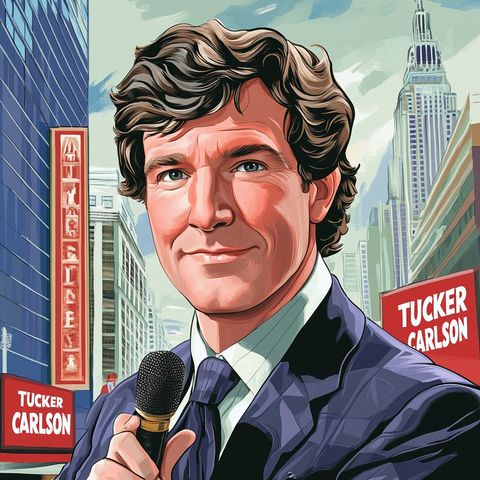Silence Amid Antisemitism: Influential Figures Avoid Criticism of Tucker Carlson's Controversial Rhetoric

Descarga y escucha en cualquier lugar
Descarga tus episodios favoritos y disfrútalos, ¡dondequiera que estés! Regístrate o inicia sesión ahora para acceder a la escucha sin conexión.
Silence Amid Antisemitism: Influential Figures Avoid Criticism of Tucker Carlson's Controversial Rhetoric
Esta transcripción es generada automáticamente. Ten en cuenta que no se garantiza una precisión absoluta.
Descripción
In an era increasingly defined by polarized political climates and the proliferation of media echo chambers, recent developments indicate a noteworthy trend within certain political circles, particularly those involving high-profile...
mostra másTucker Carlson, a prominent figure in conservative media, hosts a nightly television show on Fox News Channel, which has consistently been one of the highest-rated programs in the cable news landscape. His influence is undeniable, reaching millions of viewers across the United States each evening. The power wielded by figures like Carlson in shaping public discourse and opinion cannot be overstated.
Antisemitism, defined as hostility to, prejudice, or discrimination against Jews, has a long and dark history. In recent years, there has been a notable resurgence in antisemitic sentiments and incidents globally, from vandalized synagogues to violent attacks. This uptick has alarmed communities and leaders worldwide, leading to calls for increased vigilance and condemnation of such ideologies.
However, the decision by organizers not to publicly criticize Carlson and similar figures who have been accused of propagating antisemitic ideologies represents a significant moment of silence. This choice may be seen as a reflection of the complicated dynamics at play within the conservative movement, where internal criticism, especially of highly influential personalities, can lead to backlash and division.
Critics argue that by not denouncing these ideologies explicitly, there's an implicit tolerance that can embolden others to echo or act upon antisemitic beliefs. The silence from organizational leaders is particularly concerning given the reach and impact of the media figures in question. Their platforms afford them a substantial influence over public discourse, making any dissemination of prejudiced views particularly harmful.
On the other hand, supporters might argue that the accusations against figures like Carlson are unfounded or taken out of context, and that the freedom of speech allows for a wide range of views to be aired, regardless of how contentious they may be. This perspective underscores the delicate balance between condemning harmful ideologies and upholding freedom of expression, a debate that is as old as it is complex.
The decisions made by organizers not to engage in public criticism highlight a critical juncture in political and media landscapes. It raises pertinent questions about accountability, the responsibility of media figures in shaping societal values, and the mechanisms through which society can combat the spread of harmful ideologies while preserving foundational democratic ideals. As antisemitism continues to be a concern, the actions and inactions of influential figures and organizations will be scrutinized, shaping the ongoing discourse around the issue.
Información
| Autor | QP-2 |
| Organización | William Corbin |
| Página web | - |
| Etiquetas |
Copyright 2024 - Spreaker Inc. an iHeartMedia Company
